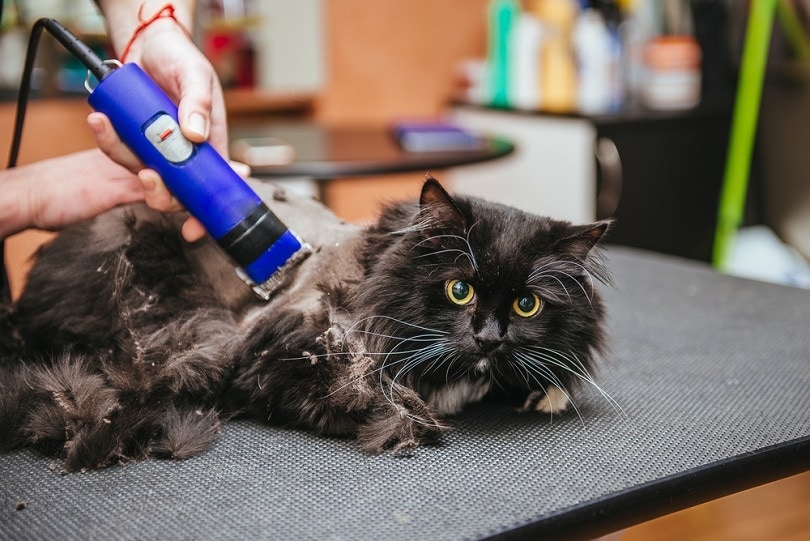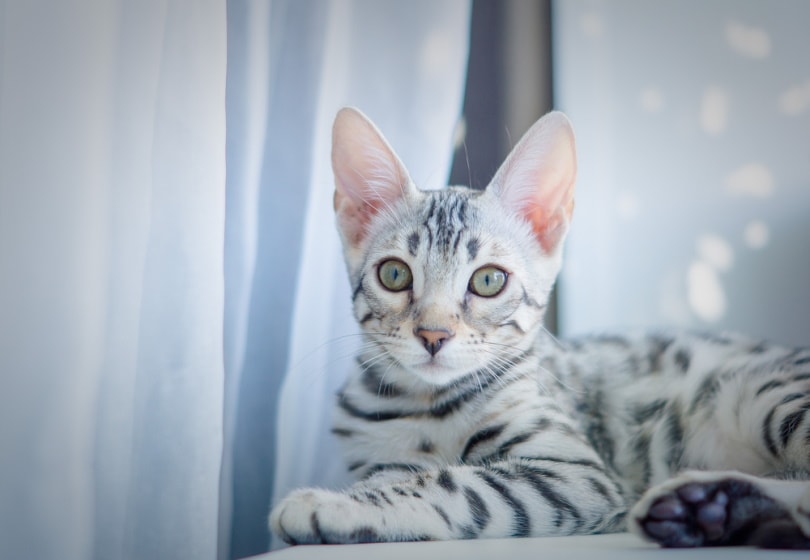What Kinds of Fish Can Cats Eat? Vet-Reviewed Facts & FAQ

Updated on
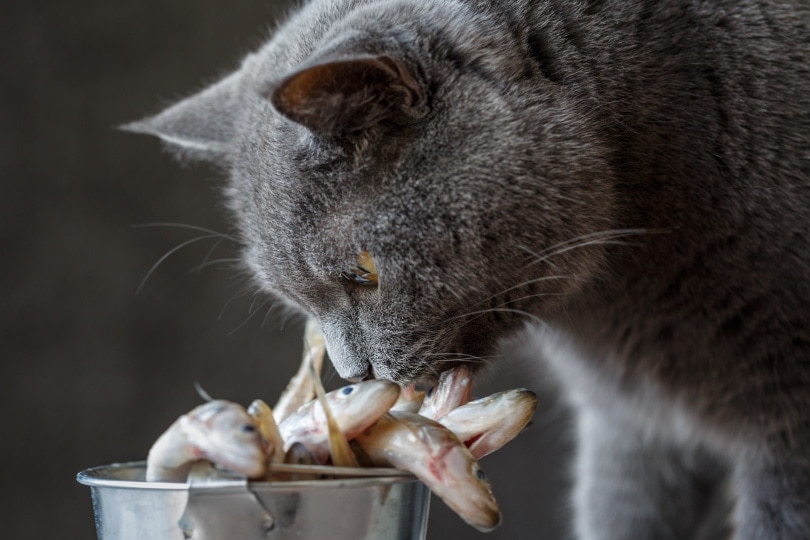
If you have a cat in your home, you already know they love fish. If you open a can of tuna, the smell immediately alerts every cat in the home and they come running. It’s reminiscent of the old Saturday morning cartoon where cats would try to outsmart one another when a large fish was the prize. Many cat owners claim that their feline’s favorite food is fish, and it can quickly turn into a cat’s personal favorite snack or meal. Some cats may even refuse other meats if they learn that begging for fish all the time will result in their ‘pawrents’ caving in to pressure!
While the narrative dictates that cats should eat fish whenever they want to, is this actually true? Is fish safe for our kitties? What kinds of fish can cats eat? These are questions we should be asking ourselves if we own a cat since we want to provide them with the best nutrition possible.
Generally speaking, cats can eat fish, but with some caveats. Let’s dive in and find the answers to all your questions so you can provide your cat with the best options when it comes to their fishy treats.
Is Fish Safe for Cats to Eat?
- Fish on its own isn’t a nutritionally complete meal for your cat. Fish will answer your cat’s obligate carnivore cravings for animal protein, but it doesn’t provide them with all the nutrition their body needs. The ancestor of our domestic cat, the African Wild Cat, lives in an environment that is mostly arid. These cats live on a diet consisting mostly of small rodents such as mice and rats, along with birds, rabbits, and small reptiles. This is the most abundant prey that inhabits the desert lands they live in.
Our feline friends may crave fish, but despite being carnivores, they have not evolved to live on fish alone on a long-term basis. What does this mean for your feline friend? Simply put, giving your cat a little fish on occasions or as a treat is fine, but it shouldn’t become the only standalone protein of their diet. - Cats should NEVER be fed fish bones, as they may cause damage to their intestinal lining or become a choking hazard.
- Cats should not be fed raw fish. Raw fish has a higher chance of being contaminated, which we’ll explain below. Consumption of these contaminants can result in an upset tummy for your feline, leading to nasty episodes of vomit or diarrhea. Additionally, raw fish poses other health risks for cats, which we’ll dig deeper into as you read on.
- Almost all fish harvested around the world contain some amount of mercury. Mercury is dangerous when consumed in high amounts or for prolonged periods, and fish that are typically high in mercury should always be avoided. These include sharks, swordfish, rays, and blue-fin tunas.
- It is always best to see where your seafood is sourced from. Sustainable forms of seafood are generally preferred over non-sustainable options, as these have a lower environmental impact.
What About Fish in Cat Food?
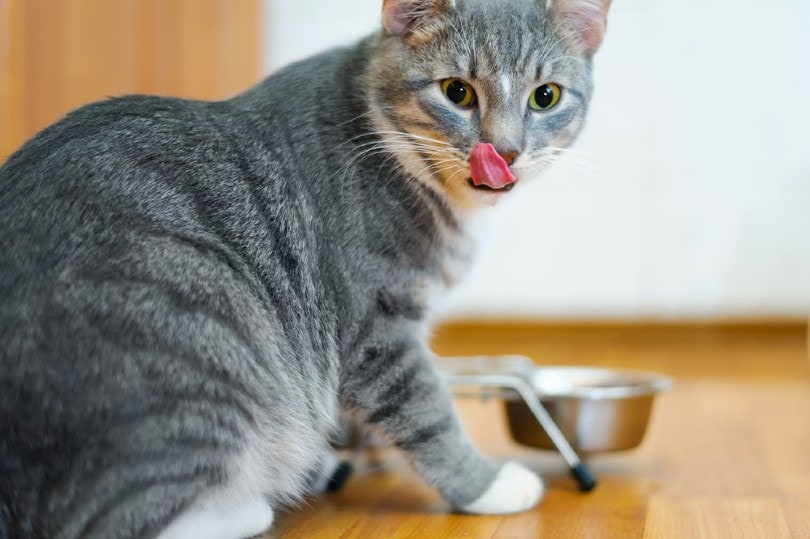
When pet owners find out that fish alone does not provide their cats with complete nutrition, they are often confused because many pet foods come in fish flavors with no other proteins. Some pet foods even incorporate a mix of different fish together.
This is usually not a problem because commercial pet foods contain additional ingredients to ensure that your cat isn’t nutritionally deprived. Therefore, while the main protein in the recipe is fish, it isn’t a standalone ingredient. These supplements ensure that your cat gets the nutrition they need.
Can Cats Eat Raw Fish?
While those Saturday morning cartoons made it appear that raw fish is safe for cats, that isn’t the case. Raw fish of any kind is not recommended as it contains an enzyme known as thiaminase. This enzyme breaks down and depletes the thiamine in your cat’s body. Thiamine is a B1 vitamin that is essential for your cat’s health and is involved in many processes throughout your cat’s body.
The earliest signs of thiamine deficiency are usually a poor appetite, weight loss, and vomiting episodes. Left untreated, this can quickly turn into complications involving your cat’s nervous system. These present as your cat being unable to walk and move properly, and it could lead to vision impairment. If you have been feeding your cat raw fish for any period of time, it is best to stop the practice and inform your vet so they may thoroughly check your cat for any health issues.
Ingestion of large quantities of raw fish for a long period of time can result in Vitamin E deficiency. Fish contains a type of fatty acids (polyunsaturated) that are easily oxidized. If a cat is fed a diet high in these fatty acids, it will need more Vitamin E. In fact, the Association of American Feed Control Officials (AAFCO) recommends that cat food containing fish oil should be supplemented with Vitamin E to avoid this dangerous deficiency. Whenever there is a mismatch between the intake of polyunsaturated fatty acids and antioxidants like Vitamin E, your cat can get sick. The condition is called pansteatitis and causes inflammation of the fat in their body. When handling your cat, you may notice pain, particularly in their back and abdomen, as well as fever.
Raw fish can also contain harmful bacteria and parasites. Two common bacteria found are Salmonella and Listeria. They can cause food poisoning in cats as well as in humans. Anisakis is a parasite commonly found in raw fish that is considered a public health problem worldwide. This roundworm has been found in cats as well, so this is another reason not to feed raw fish to your feline.
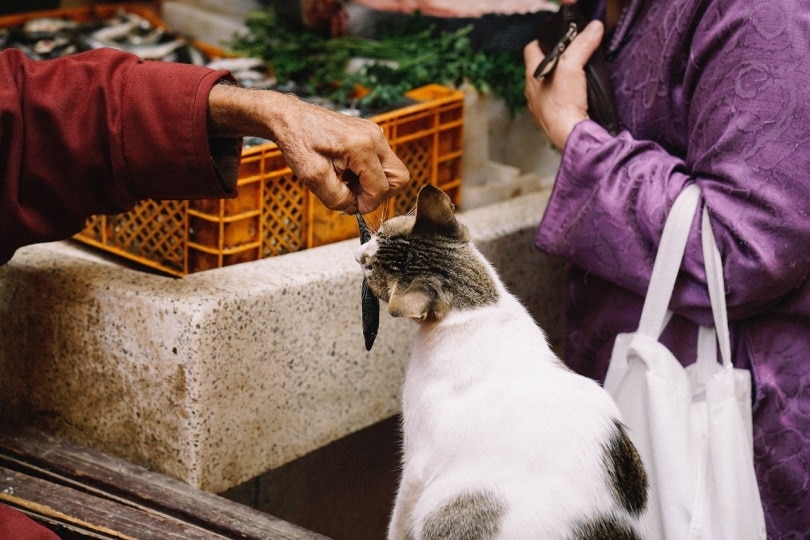
Oily Fish
Oily fish isn’t a particular species of fish, but rather a term given to fish that have high amounts of oil in their body and gut. The filets of such fish contain high amounts of omega oils, a popular health supplement. Oily types of fish can be quite beneficial to your cat, but only when they are cooked and not served raw. These types of fish provide your cat with healthy fats like Omega-3 and Omega-6. These two fats are great for your kitty’s general well-being and health. Fish oil is also a great supplement for cats that suffer from inflammatory conditions or long-term painful conditions like arthritis.
The main concern with oily fish is that it can be quite high in mercury. The amount of mercury inside a fish can vary quite a bit and depends on factors like the fish’s age and size, along with the amount of pollution in the environment it lived in. They also feed on other fish and ingest their mercury content. Prolonged feeding of such fish to your cat can lead to mercury poisoning and a trip to your veterinarian.
Here are a few oily fish that, when served properly, can provide them with the health benefits mentioned above:
- Sardines
- Herring
- Trout
- Salmon
- Sardines
However, keep in mind that you should take extra care when handling oily fish. Bacterial contamination can cause histamine release from spoiled oily fish. If ingested, the histamine-loaded meat will result in scombrotoxin poisoning.
Line Fish
While line fish don’t provide the same types of healthy fats and oils as the oily fish we mentioned above, they won’t do any harm to your cat when prepared properly and not fed raw. They can be used as a treat or occasional addition to your cat’s main diet. You can serve your cat these types of fish boiled, baked, or grilled as long as they are deboned and free from potentially dangerous salts and seasonings. Most human-grade food seasonings are not safe or recommended for your cats.
Here are a few line fish your kitties will absolutely love:
- Halibut
- Cod
- Hake
- Flounder
Other Fishy Treats for Kitties
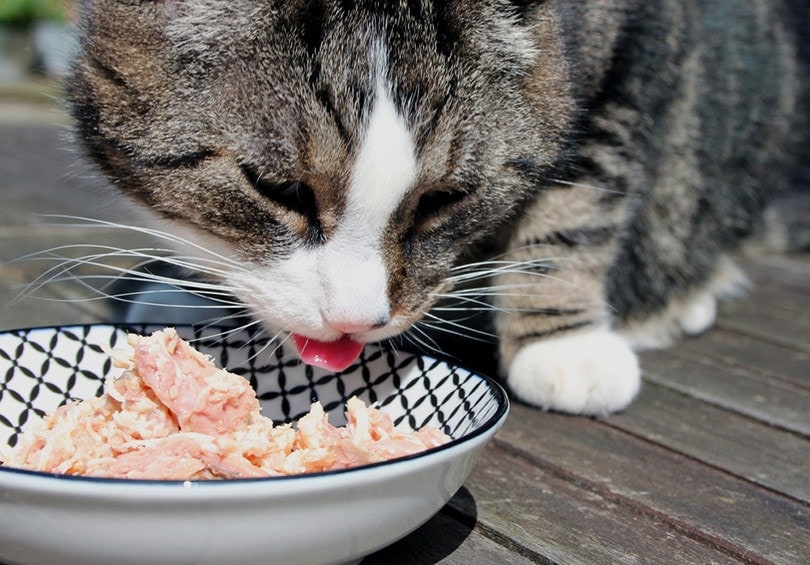
With raw fish being a no-go for your cat, sushi is out. There are other fishy treats your cat can enjoy, however. Let’s take a look at a few you can offer your cat.
Shellfish
Yes, if it is cleaned and cooked properly, your cat can enjoy shellfish. However, you shouldn’t use human food seasonings on shellfish that you wish to give your cat. Shellfish are a good source of protein, low in saturated fats, and can provide your cat with lots of minerals such as iron, calcium and zinc. Here are some shellfish that are safe for your cat to enjoy:
If you want to give your cat a yummy, fishy treat, any of these types of shellfish can be added to their bowl. Just remember, it shouldn’t act as a replacement for your cat’s normal food.
Other Ocean Dwellers
If your cat loves fish, some other ocean dwellers are safe to eat when prepared properly. Most of these fishy treats provide cats with vitamins and minerals but aren’t suitable for complete diet replacement. Like with everything else on our list, make sure all of these sea creatures are clean and fully cooked to avoid any issues with contamination.
Fish to Avoid
Certain sea and ocean dwellers can be extremely dangerous when prepared incorrectly or are just not worth the health risk for your cat. Additionally, some of these animals can sting if raw or fed live, so they are best avoided.
- Pufferfish: Avoid all pufferfish, especially the fugu fish.
- Octopus: certain species of octopus, such as the Blue-Ringed Octopus, are poisonous, and it is almost always safer to avoid octopus rather than feed them to your cat. Octopuses are also difficult to sustainably harvest, and their consumption is discouraged in many parts of the world.
- Fish/Shellfish Your Cat Is Allergic To: Yes, like you, your cat may also have an allergy to specific fish or shellfish. Food items that your cat is allergic to should be avoided, even if your kitty begs for them.
Now that you know what you can safely feed your cat, it’s just as important to find a bowl that supports their health and well-being. With whisker-friendly bowls and a wide tray to catch any spills, our Hepper NomNom Cat Bowl is our favorite option.
Conclusion
While fish may be a great treat or occasional meal option, there are precautions you need to take to ensure your cat’s safety. Different types of fish have different nutritional profiles and potential benefits and risks for your feline friend. Don’t fret though, with many of the fishy options mentioned above, you can provide your kitty with vitamins, minerals, and protein and still allow your feline pal the opportunity to eat fish now and then.
Always remember to thoroughly clean and cook any fish you give your kitty. Your cat may not act like those in the cartoons, but you can still make them happy with fresh fish when the chance arises.
Related Reads:
Featured Image Credit: Natalia Sokko, Shutterstock


